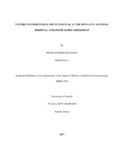| dc.description.abstract | Background: Hydrocephalus remains one of the common conditions managed by any neurosurgical service. A VP shunt complication is a major obstacle in the management of hydrocephalus. Analysis of data and outcomes in relation to hydrocephalus and shunt procedures would be useful in improving neurosurgical services. Additionally, assessment of risk factors for shunt failure would serve as a platform for the eventual establishment of effective measures to lower procedural variability and improve outcomes.
Objective: This study therefore aimed to assess the etiology of hydrocephalus, shunt outcomes and factors affecting shunt survival at Kenyatta National Hospital. Study design: A prospective, non-controlled, open-label registry to investigate patients with de novo catheter implantation or catheter replacement of an existing ventriculoperitoneal shunt. The primary outcome was shunt survival.
Materials and methods: Following ethical approval, patients who fit the inclusion criteria were recruited and relevant data was retrieved and input in a preformed data collecting sheet. Assessment of patient biodata, etiology of hydrocephalus, surgical procedure as well as the development of shunt malfunction during a 3-month follow-up period was done. Data was analyzed using SPSS software (Version 19.0, Chicago Illinois) with a p value <0.05 being considered statistically significant.
Results: During the study period, 154 patients met the inclusion criteria and were recruited in the study. There was slight male predominance with 86 (55.8%) male patients and a mean and median age at presentation of 3 years and 3.5 years respectively. Most of the patients (102 patients; 66.2%) were below 5 years of age. Majority of the patients (88 patients; 57.1%) had
post-meningitic hydrocephalus. A total of 35 patients (22.7%) had 39 complications within the study period. Kaplan–Meier shunt survival analysis for adult hydrocephalus showed overall median time to first shunt failure was 69 days ranging from 0 to 362 days and 30 (76.9%; n=39) of these complications occurred within the first 3 months. The most common complications were shunt blockage (n=16, 10.4%) and shunt infection (n=14, 9.1%). The development of shunt failure was significantly influenced by the principal etiology of the hydrocephalus (P = 0.030), principal etiologies (P = 0.003, log-rank test), age (P < 0.001, log-rank test), duration of hospital stay (P < 0.001, log-rank test), patients‘ pre-operative GCS score of less than 13 and the placement of extra-ventricular drains (P = 0.033, log-rank test) before VP shunt.
Conclusion and Recommendations: Post-meningitic hydrocephalus is the most common encountered aetiology of hydrocephalus among our patient cohort. Though comparable to some other studies, shunt failure remains high among shunted patients at the Kenyatta National hospital with shunt obstruction predominating. Age, primary aetiology, patient‘s pre-operative neurologic status and the use of an EVD significantly influence VP shunt survival at KNH. Development of a shunt registry capturing all hydrocephalic patients would be beneficial to achieve larger patient numbers with a longer follow-up period to assess the long-term shunt outcomes among our patients.
Key Words: Hydrocephalus, Ventriculoperitoneal shunt, Complications, Survival | en_US |
| dc.description.department | a
Department of Psychiatry, University of Nairobi, ; bDepartment of Mental Health, School of Medicine,
Moi University, Eldoret, Kenya | |



